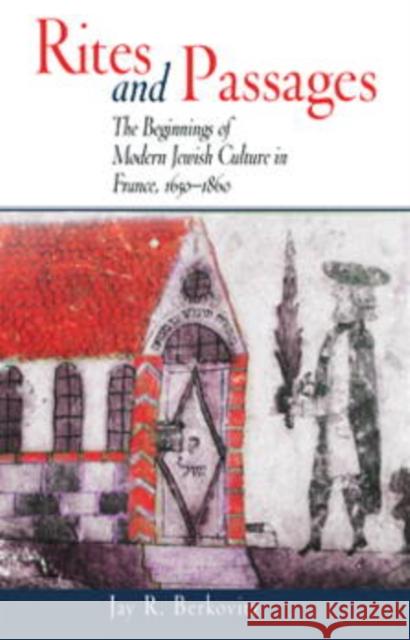Rites and Passages: The Beginnings of Modern Jewish Culture in France, 1650-1860 » książka
Rites and Passages: The Beginnings of Modern Jewish Culture in France, 1650-1860
ISBN-13: 9780812220087 / Angielski / Miękka / 2007 / 344 str.
Rites and Passages: The Beginnings of Modern Jewish Culture in France, 1650-1860
ISBN-13: 9780812220087 / Angielski / Miękka / 2007 / 344 str.
(netto: 129,76 VAT: 5%)
Najniższa cena z 30 dni: 130,31
ok. 30 dni roboczych
Bez gwarancji dostawy przed świętami
Darmowa dostawa!
Delves into Jewish religion and culture at a time of profound social and political revolution in the wider European culture. In September 1791, two years after the Revolution, French Jews were granted full rights of citizenship. General and Jewish scholarship has traditionally focused on this turning point of emancipation while often overlooking many of the most crucial aspects of French Jewish history. In Rites and Passages, Jay R. Berkovitz argues that no serious treatment of Jewish emancipation can ignore the cultural history of the Jews during the ancien regime. It was during the late seventeenth and eighteenth centuries that several lasting paradigms emerged within the Jewish community--including the distinction between rural and urban communities, the formation of a strong lay leadership, heightened divisions between popular and elite religion, and the strain between local and regional identities. Each of these developments reflected the growing tension between tradition and modernity before the tumultuous events of the French Revolution. Rites and Passages emphasizes the resilience of religious tradition during periods of social and political turbulence. Viewing French Jewish history through the lens of ritual, Berkovitz describes the struggles of the French Jewish minority to maintain its cultural distinctiveness while also participating in the larger social and economic matrix. In the ancien regime, ritual systems were a formative element in the traditional worldview and served as a crucial repository of memories and values. After the Revolution, ritual signaled changes in the way Jews related to the state, French society, and French culture. In the cities especially, ritual assumed a performative function that dramatized the epoch-making changes of the day. The terms and concepts of the Jewish religious tradition thus remained central to the discourse of modernization and played a powerful role in helping French Jews interpret the diverse meanings and implications of emancipation. "Although the French National Assembly granted Jews citizenship in 1791, this magisterial book argues that the meanings of this revolutionary watershed must be understood through much longer-running discussions and complex variations among French Jews. . . . This detailed volume . . . should interest a wide range of scholars in religious and civic history."--Choice Introducing new and previously unused primary sources, Rites and Passages offers a fresh perspective on the dynamic relationship between tradition and modernity. Jay R. Berkovitz is Professor of Judaic and Near Eastern Studies at the University of Massachusetts, Amherst. He is the author of The Shaping of Jewish Identity in Nineteenth-Century France.
Delves into Jewish religion and culture at a time of profound social and political revolution in the wider European culture. In September 1791, two years after the Revolution, French Jews were granted full rights of citizenship. General and Jewish scholarship has traditionally focused on this turning point of emancipation while often overlooking many of the most crucial aspects of French Jewish history. In Rites and Passages, Jay R. Berkovitz argues that no serious treatment of Jewish emancipation can ignore the cultural history of the Jews during the ancien régime. It was during the late seventeenth and eighteenth centuries that several lasting paradigms emerged within the Jewish community--including the distinction between rural and urban communities, the formation of a strong lay leadership, heightened divisions between popular and elite religion, and the strain between local and regional identities. Each of these developments reflected the growing tension between tradition and modernity before the tumultuous events of the French Revolution. Rites and Passages emphasizes the resilience of religious tradition during periods of social and political turbulence. Viewing French Jewish history through the lens of ritual, Berkovitz describes the struggles of the French Jewish minority to maintain its cultural distinctiveness while also participating in the larger social and economic matrix. In the ancien régime, ritual systems were a formative element in the traditional worldview and served as a crucial repository of memories and values. After the Revolution, ritual signaled changes in the way Jews related to the state, French society, and French culture. In the cities especially, ritual assumed a performative function that dramatized the epoch-making changes of the day. The terms and concepts of the Jewish religious tradition thus remained central to the discourse of modernization and played a powerful role in helping French Jews interpret the diverse meanings and implications of emancipation. "Although the French National Assembly granted Jews citizenship in 1791, this magisterial book argues that the meanings of this revolutionary watershed must be understood through much longer-running discussions and complex variations among French Jews. . . . This detailed volume . . . should interest a wide range of scholars in religious and civic history."--Choice Introducing new and previously unused primary sources, Rites and Passages offers a fresh perspective on the dynamic relationship between tradition and modernity. Jay R. Berkovitz is Professor of Judaic and Near Eastern Studies at the University of Massachusetts, Amherst. He is the author of The Shaping of Jewish Identity in Nineteenth-Century France.











